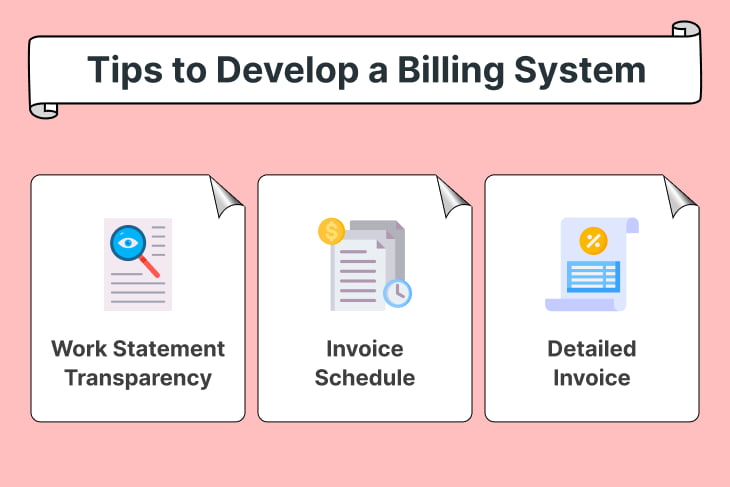Tips to develop a Billing System

Below are some of the essential tips to develop a billing system that can help businesses prosper.
Work statement transparency
More than merely writing something down, creating a proposal or statement of work entails setting the groundwork for a fruitful client partnership. The purpose of it is to outline exactly what you will be working on, along with the prices, timeframes, and deliverables. In order to have a productive working relationship, it is imperative that you are transparent and truthful about your terms and conditions.
Invoice Schedule
Creating and following a regular billing schedule increases process predictability and improves cash flow. Setting precise invoicing dates that coincide with your client’s payroll cycle is crucial.
Regardless of the billing frequency you choose—weekly, bi-weekly, or monthly—the most important thing is to adhere to the plan exactly. In order to minimize uncertainty and lower the possibility of late or missed payments, this uniformity can be implemented in the billing system.
Detailed Invoice
Furthermore, provide the invoice that contains all the details of the work done. You can take the help of Alian Hub. This project management app allows you to track the work done and generate the total billing amount. It calculates the work done with respect to working hours. You can set the currency and the rate per hour and Alian Hub will generate detailed reports for the billing system.
Ways to take followups on overdue payments
- Inform the client of the specified conditions of payment, the deadlines, and any relevant fines for making payments beyond the deadline.
- Write a reminder mail that is kind yet strong. You may indicate the amount and due date of the past-due payment by lightly highlighting it. Show empathy and offer any clarification that’s needed to show your continued dedication to cooperative and long-lasting cooperation.
- Furthermore, without requiring ongoing personal interaction, an automatic payment reminder system acts as a kind but persistent nudge to remind clients of impending or past-due payments. Additionally, customizing the reminders to correspond with customer preferences improves user experience and helps foster a more thoughtful and individualized communication strategy.
Use project management tools as a billing system
Furthermore, you need an accurate time tracker to document daily activities, ongoing projects, and meetings in order for the bills to be correct. The Alian Hub Time Tracking tool can assist you in more accurately collecting bills if you charge on an hourly basis. It provides an easy-to-use interface for tracking the exact number of hours you and your team devote to a customer. Run timers to guarantee accurate invoicing for all current tasks. Additionally, you can choose how to arrange, sort, and filter your billing jobs with task views, which provide you with many ways to see them.
Conclusion
Developing a robust billing method is crucial for businesses to ensure accurate and timely payment collection. By following best practices, organizations can streamline their billing processes, enhance customer satisfaction, and maintain financial stability. In this post, we have covered key elements such as clear pricing structures, transparent communication, and followups. Implementing these practices will contribute to an efficient and error-free billing system, ultimately benefiting both businesses and their customers.

